

Financial Conflicts of Interest and Reporting Bias Regarding the Association between Sugar-Sweetened Beverages and Weight Gain: A Systematic Review of Systematic Reviews. Big-sugar-tips-the-balance-of-the-research-scale/ PepsiCo. Gatorade.com. Gatorade sports science inst. Since its auspicious start, Gatorade has gone on to qualify its reputation around the world by establishing scientific links with recognised institutions, as well as setting up the Gatorade Exercise Physiology Laboratory in Barrington, Illinois, in 1985 to conduct scientific research in the areas of exercise, sports and nutrition.
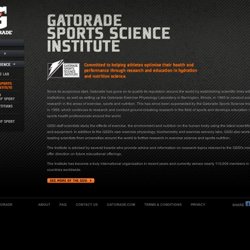
This has since been superseded by the Gatorade Sports Science Institute (GSSI) in 1988, which continues to research and conduct ground-breaking research in the field of sports and develops education materials for sports health professionals around the world. GSSI staff scientists study the effects of exercise, the environment and nutrition on the human body using the latest scientific technology and equipment. In addition to the GSSI's own exercise physiology, biochemistry and exercise sensory labs, GSSI also works with leading scientists from universities around the world to further research in exercise science and sports nutrition. Gatorade Sports Science Institute.
BMJ: The truth about sports drinks. Deborah Cohen, investigations editor Author Affiliations dcohen@bmj.com Sports drinks are increasingly regarded as an essential adjunct for anyone doing exercise, but the evidence for this view is lacking.
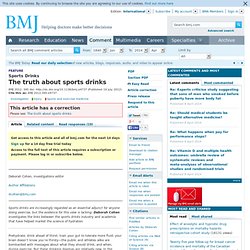
Video: Round table on the problems with sports product evidence. How valid is the European Food Safety Authority’s assessment of sports drinks? Matthew Thompson, senior clinical scientist1, Carl Heneghan, reader in evidence based medicine1, Deborah Cohen, investigations editor2 Author Affiliations Correspondence to: M Thompson matthew.thompson@phc.ox.ac.uk Matthew Thompson, Carl Heneghan, and Deborah Cohen find worrying deficiencies in the evidence used to support the health claims made for sports drinks Back in January 2006, the European Union decided to adopt legislation to assess health and nutrition claims related to foods.1 The EU regulation aims to ensure that “claims made on food labelling and advertising regarding nutrition and health are meaningful and accurate, and can thereby help consumers in making healthy diet choices.”
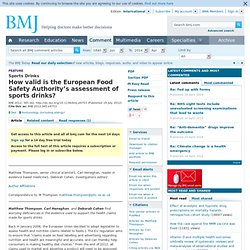
From the end of 2012, all claims used to market and advertise a product will need to be approved. The body responsible for evaluating the scientific basis of health claims is the European Food Safety Authority (EFSA). The truth about sports drinks. Dear Editor: The BMJ feature The “Truth” About Sports Drinks contains in places portions of text that are essentially executive summaries of industry conspiracy theories and promotion of hyponatremia through irresponsible guidelines outlined in Prof.
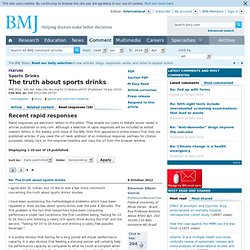
Noakes’ book Waterlogged.1 In addition, the trade ‘secrets’ of sport drink manufacturers are ‘exposed’. The ‘evidence’ presented for the conspiracy is thin at best and has been contested (see as one example one response from one ‘insider’ Dr. Michael Sawka - More insidious, and of arguably greater consequence, is the suggestion that sport drinks promote obesity. What would have been prudent to see in this piece was perhaps some kind of response or opposite viewpoint to Dr. Loughborough University School of Sport, Exercise and Health Sciences.
Profile Ron Maughan obtained a BSc (Physiology) and PhD from the University of Aberdeen, and held a lecturing position in Liverpool before returning to Aberdeen where he was based in the Medical School for almost 25 years.

Professor Maughan is a Fellow of the American College of Sports Medicine and received that organisation's Citation Award in 2007. He is also a member of the Physiological Society, the Nutrition Society, the Biochemical Society, and the Medical Research Society. He chaired the Human and Exercise Physiology group of the Physiological Society for 10 years and was a member of the Council of that organisation. He is Chair of the Sports Nutrition group established by the IOC Medical Commission in 2002. He has acted as an adviser to UK Sport, UK Athletics, The FA, FIFA, the Irish Sports Council and to various other sporting bodies. Image SSer. Louise Burke - Head of Sports Nutrition. PhD, BSc, Grad Dip Diet, FSMA, FACSMlouise.burke@ausport.gov.au Education.
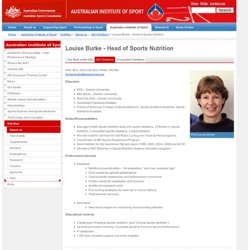
Image asJ4. The College of Education - Edward Coyle, Ph.D. Dr.

Coyle investigates the physiological factors that regulate human endurance performance. He has focused on the cardiovascular and metabolic factors that limit oxygen delivery and substrate utilization by exercising muscle. Furthermore, Dr. Coyle is interested in the physiological factors that influence maximal neuromuscular power. Dr. Image 5KjK. Mythbusting sports and exercise products. Carl Heneghan, clinical reader in evidence based medicine, Peter Gill, DPhil candidate, Braden O’Neill, DPhil candidate , Dan Lasserson, clinical lecturer , Miriam Thake, visiting research assistant, Matthew Thompson, clinical reader , Jeremy Howick, research fellow Author affiliationsCorrespondence to: C Heneghan carl.heneghan@phc.ox.ac.uk Carl Heneghan and colleagues examine the evidence behind the claims made for sports and exercise products There is no doubt that sport and exercise are beneficial for health and wellbeing.
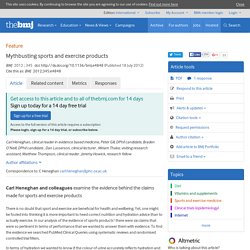
Yet, one might be fooled into thinking it is more important to heed correct nutrition and hydration advice than to actually exercise. Deborah Cohen @deb_cohen. BMJ: Energy drinks and alcohol: research supported by industry may be downplaying harms. Peter Miller, associate professor, School of Psychology, Deakin University, Geelong, Victoria, 3220, AustraliaPeter.Miller@deakin.edu.au Mixing alcohol with so called energy drinks has become popular, but with what risk?
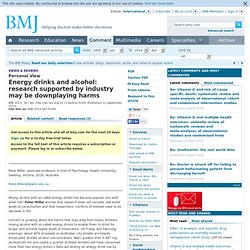
Peter Miller worries that research does not consider real world levels of consumption and that researchers’ conflicts of interest need to be declared in full Concern is growing about the harms that may arise from heavy drinkers mixing alcohol with so called energy drinks to enable them to drink for longer and achieve higher levels of intoxication. Epidemiological studies show that drinkers who consume energy drinks are more likely to record a higher breath alcohol concentration than those who do not.4 They are also more likely to report drinking more alcohol5; engaging in aggressive acts1; being injured1 6; symptoms of alcohol dependence7 …
BMJ: Just how harmful are energy drinks mixed with alcohol? Some researchers are drawing ‘no harm’ conclusions about mixing alcohol with energy drinks even though their research does not reflect real world levels of use, and research funded by a major producer of energy drinks may be confusing the evidence base, suggests a doctor in a personal view published on bmj.com today.
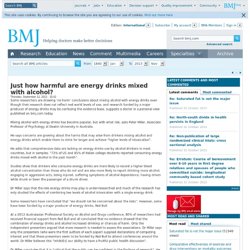
A survey of energy drink consumption patterns among college students. A Registered Dietitian and a Health Educator designed a questionnaire that assessed consumption patterns of energy drinks among college students. We initially interviewed a focus group of 32 college students who were enrolled in a senior-level course. We asked these students open-ended questions regarding situations in which college students use energy drinks, the most common energy drinks college students were using, frequency patterns (average number of energy drinks consumed for each situation the focus group identified and the average number of times per month throughout a semester students use energy drinks for each situation), and side effects from using energy drinks.
Based on the focus group responses we developed a 19-item questionnaire. Questions 1 and 2 assessed demographic information (age and sex). The institution is a state university, located in the Central Atlantic region of the United States. Analyses were performed using JMP IN® software [14]. Video: Research supported by energy drink industry may be downplaying harms: doc. How safe is it to mix energy drinks with alcohol? An Australian doctor is arguing there’s not enough good research to know the answer, since many of the studies already published on the matter have been funded by the energy drink companies themselves. In an opinion piece in the British Medical Journal, Dr. Peter Miller, an associate professor of psychology at Deakin University in Australia, writes that many of the researchers who have offered reassuring conclusions about the effects of mixing alcohol and caffeine-laden drinks have been funded by Red Bull, a major producer of energy drinks.
“These researchers have presented their findings at special sessions on alcohol and energy drinks at international conferences where, because of limited disclosure requirements, audiences may not be aware of the extent of their industry sponsorship,” Miller writes. “Only the independent presenters argued that more research is needed to assess the associations,” he said. CTV’s medical commentator Dr. Intake of energy drinks in association ... [Alcohol Clin Exp Res. 2007. Assoc Prof. Peter Millar Deakin Univ: Faculty of Health. 'Lack of evidence' that popular sports products work. 18 July 2012Last updated at 21:23 ET Puma shoes carried Jamaica's Usain Bolt to Olympic Gold in the 100-metre sprint in Beijing in 2008 Consumers could be wasting their money on sports drinks, protein shakes and high-end trainers, according to a new joint investigation by BBC Panorama and the British Medical Journal.
The investigation into the performance-enhancing claims of some popular sports products found "a striking lack of evidence" to back them up. A team at Oxford University examined 431 claims in 104 sport product adverts and found a "worrying" lack of high-quality research, calling for better studies to help inform consumers. The Truth About Sports Products: A Panorama Special - BBC One. The BMJ's Amazing Shock and Awe Assault on Sport Drink Science. Wow. Wow, WOw, WOW! What words would you use to describe a situation where one of the world's most prominent medical journal publishes, not just one article critical of a specific category of food, but seven such articles, and where those articles come to the conclusion that the food is being marketing on the basis of food industry funded hype and collusion?
I'd use the words, "Thank You"! You'll definitely hear about it in the news today as the British Medical Journal has 7 incendiary pieces that are highly critical of sport and energy drinks, their Big Food parents and the researchers that are conflicted by them. The first piece, Research: The evidence underpinning sports performance products: a systematic assessment has researchers analyzing sport drink advertising and identifying an astonishing 431 performance enhancing claims for 104 different products.
Do Sports Drinks Really Work? Just in time for the Summer Olympics in London, a top science journal has issued a blistering indictment of the sports drink industry. According to the series of reports from BMJ (formerly British Medical Journal), the makers of drinks like Gatorade and Powerade have spent millions in research and marketing in recent decades to persuade sports and medical professionals, not to mention the rest of us suckers, that a primal instinct—the sensation of thirst—is an unreliable guide for deciding when to drink. We've also been battered with the notion that boring old water is just not good enough for preventing dehydration. I've been as susceptible to this scam as anyone else; I knew, or thought I knew, that if I'm thirsty after my half-hour go-round on the elliptical trainer, it means I was underhydrated to begin with.
So for years I've been trying to remember to ignore my lack of thirst and make myself drink before working out. Not any more. Energy Drinks. Lucozade to set up academy of sports nutrition. Research & Development - PepsiCo Nederland. What Role Should Coca-Cola Play In Obesity Research? What Role Should Coca-Cola Play In Obesity Research? Casper Hulshof sur Twitter : "Onderzoek Coca Cola toonde ooit aan: als je niet vroeg genoeg het begon te drinken lag je eruit in het leven!